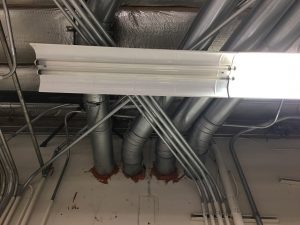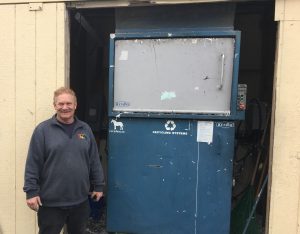Creative Labels, located in Gilroy, CA, has been in the business of producing high-quality labels for more than 35 years. The labels they produce are primarily for prime foods and beverages.
Label making generates a great deal of trim waste consisting of paper and plastic. When the label producing machines operate for what are generally 12 hour-days during busy seasons, considerable waste is produced. Prior to 2004, Creative Labels had to wind up the waste from their machines, stop the presses to remove the rolls and try to stomp down the waste to compact it somewhat before putting it into containers. That made it difficult, costly, and time-consuming to dispose of this waste. However, in 2004 when the KenBay RotoPac compactor became available in the US, Creative Labels installed one because it offered significant uptime on the printing presses, which saved time, labor and money.

Figure 1.
The KenBay RotoPac offers label makers the opportunity to blow the trim directly into the compactor while compacting it into large polyethylene bags. The RotoPac has a small footprint, so it requires little space and can compact between 600 and 800 lbs. of trim-filled bags at the rate of up to 300 lbs. per hour. The RotoPac compacts with a rotating drum providing 4,400 ft-lbs of torque in a sweeping motion compacting the trim 6 to 8 times. This reduced the trips to the dump by a factor of at least 6 times. Another benefit of using the RotoPac is that it keeps the area around the machines free of the mess that is generated from the machines. Rather, the waste is blown directly into the top of the RotoPac. Creative Labels is taking advantage of the throughput of the RotoPac by blowing the trim from a Rotopress and three Mark Andy flexo presses, into the compactor, making it necessary for the RotoPac to continuously operate. See Figure 1:
In summary, the RotoPac provides high compaction at a high rate where the waste is generated into bags making the process transparent to producing high-quality labels.

Figure 2.
Creative Labels has demonstrated that after 14 years, the RotoPac continues to compact waste 12 hours per day with minimum maintenance. Dennis Brundage, maintenance manager who has added features to their RotoPac to improve its performance for their application, says “that low maintenance is important because in their shop there is always some machine needing attention”. See Dennis in figure 2 where their RotoPac is still in great shape after heavy usage for 12 hours a day, 5 days a week for 14 years.
To learn more about the new smart RotoPac, contact KenBay.


